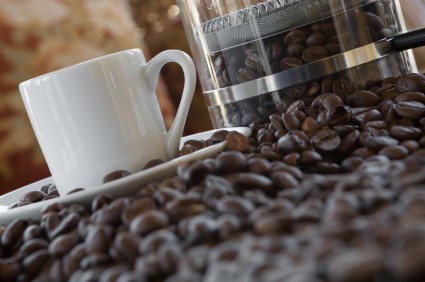
UC HEALTH LINE: Tall Mocha Latte in Adolescence May Lead to Short, Tubby Physique in Adulthood
![]()
CINCINNATINothing sounds better in the morning than a lattebetter yet, a white chocolate mocha latte.
But the new trend, especially for teens and tweens, is not just hitting the coffee shop for a morning jolt.
A growing number of adolescents seem to be replacing their breakfast, afternoon snack, milk and water intake with a tall sugary coffee drink, and UC experts say this could lead to a number of health issues.
Michael Benedict, MD, an assistant professor at UC and physician for internal medicine and pediatrics at University Pointe, says although there is not much research showing a growth in this trend, he suspects it is a reality.
A study done in 2006 showed that coffee and tea intake in teens was reported to be fairly low, but that did not account for sweetened coffee drinks, he says, noting that the No. 1 beverage teens consume is soda. Children are starting to drink soda by age 5, and anecdotally, I think more young people are consuming coffee beverages than ever before.
Benedict says soda has about 160 calories per 12-ounce serving, but a tall white chocolate mocha latte from Starbucks has about 330 caloriesalmost double the calories for the same amount of liquid.
And the caffeine content is nearly four times as much, too, he adds.
This could not only lead to weight gain, but, if intake of these beverages is overdone, adolescents could develop insomnia, fatigue or jittery behavior, which can hinder concentration.
Excessive intake of empty calories and caffeine may negatively impact normal growth and lead to continued problems in adulthood.
Benedict says consumption of coffee drinks or soda in moderation is acceptable.
Once in awhile, a soda or any caffeinated or sugary drink is all right for teens, he says, adding that children under age 12 should be given very minimal amounts of these drinks and virtually no coffee, in his opinion. However, parents should monitor the intake of these sorts of beverages closely and make sure their children are opting for water or more nutritious beverages, such as milk, most of the time.
Benedict also says kids today are not getting enough calcium in their diets, which could also affect the growth and health of young bones.
He says that adolescents should be snacking on fruits and veggies instead of sugar-loaded fillers, eating breakfast daily and maintaining an active lifestyle.
A glass of soda or a cup of coffee every now and again isnt going to hurt you, he says. One or two or more every day is going to catch up to you sooner or later.
Its better to form good habits now to ensure optimal health later in life.
Tags
Related Stories
Can new rules in Ohio address a pharmacy staffing shortage and...
May 17, 2024
The University of Cincinnati's Michael Hegener joined WVXU's Cincinnati Edition to discuss recent rules released by the Ohio Board of Pharmacy designed to address pharmacy staffing.
Is ketamine the answer to treatment-resistant depression?
May 16, 2024
The University of Cincinnati's Stephen Rush joined WVXU's Cincinnati Edition to discuss the use of ketamine and esketamine to treat treatment-resistant depression.
UC study: Severe ischemic strokes rare in total patient...
May 15, 2024
The University of Cincinnati’s Yasmin Aziz will present research at the European Stroke Organisation Conference that found severe ischemic strokes with the most severe damage are rare in the total stroke patient population.
